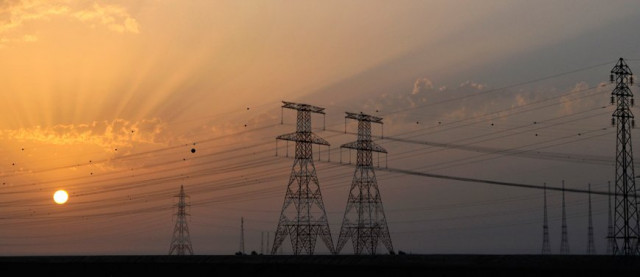Power tariff rises Rs1.8 on fuel cost adjustment
Consumers will pay an additional Rs13.5 billion after price revision

PHOTO: REUTERS
The tariff was revised upwards on account of fuel cost adjustment as the cost of fuel went up while consumers got electricity at lower tariffs. Power distribution companies will include the tariff hike of Rs1.80 per unit in next month’s electricity bills and will collect an additional Rs13.5 billion from the consumers.
The tariff adjustment will, however, not be applicable to the lifeline consumers, who consume up to 50 units a month, and K-Electric consumers. At a public hearing on Wednesday of a petition filed by the Central Power Purchasing Agency (CPPA) on behalf of the distribution companies, Nepra was informed that liquefied natural gas (LNG) and coal-based power plants were not operated in January, which burdened power consumers with an additional cost of Rs6.7 billion.
The regulator sought explanation from the CPPA for not running LNG and coal-fired plants during the month.
CPPA authorities revealed that hydroelectric power generation remained lower in January 2019 compared to the same period of previous year. They pointed out that LNG, which was a cheaper fuel, was not provided despite request, adding locally produced gas was not available due to gas shortage in the country.
Nepra member Saifullah Chatta said the regulator would withdraw its decision on increase in electricity tariff on account of fuel cost adjustment if the CPPA failed to give a satisfactory explanation about LNG supply to power plants.
The CPPA would have to provide credible information about unavailability of LNG and coal for running power plants in January.
The CPPA had sought a tariff increase of Rs1.9382 per unit, saying the actual cost of electricity generation stood at Rs7.6959 per unit against reference fuel price of Rs5.7576, an increase of Rs1.9382.
The CPPA purchased 12.24 gigawatt-hours (GWh) of electricity from high-speed diesel-based power plants at a cost of Rs18.50 per unit. It bought 1,722.06GWh from residual fuel oil-based plants, which accounted for 22.18% of the total generation, at a cost of Rs13.92 per unit. The cost of electricity based on re-gasified LNG came in at Rs5.07 per unit and its share was 14.66% in total electricity generation in the country. From this source, 1,138.25GWh was produced in the month. Generation by hydroelectric power plants totalled 477.62GWh, constituting 6.15% of the total generation.
The cost of electricity generated with the help of domestically produced natural gas was calculated at Rs5.07 per unit and its total share in electricity generation was 22.02% or 1,709.42GWh. Coal-fired power generation contributed 1,451.80GWh, accounting for 18.7% of the total generation at a cost of Rs6.79 per unit.
Nuclear power plants generated 905.62GWh, having a share of 11.66% at a cost of Rs0.95 per unit, the cheapest amongst all fuel sources. In January, 35.04GWh of electricity was imported from Iran for Rs11.5709 per unit. From bagasse, 86.42GWh was generated at a cost of Rs6.18 whereas 156.27GWh and 43.20GWh were produced from wind and solar sources respectively. The CPPA revealed that a total of 7,763.57GWh was generated in January and the power distribution companies were delivered a net 7,423.11GWh.
Published in The Express Tribune, February 21st, 2019.
Like Business on Facebook, follow @TribuneBiz on Twitter to stay informed and join in the conversation.



















COMMENTS
Comments are moderated and generally will be posted if they are on-topic and not abusive.
For more information, please see our Comments FAQ